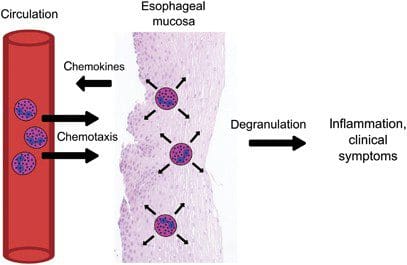Introduction
The gastrointestinal tract is part of the digestive system and its primary job is to make sure that the food is being consumed and digested to be turned into vitamins and nutrients for the body. The gastrointestinal tract also provides a protective layer in the intestinal permeability to prevent toxins and unwanted pathogens from leaking out of the gut and causing inflammation as well as other problems to the body. One of these pathogens is known as eosinophilic esophagitis and it can cause the gastrointestinal tract to be dysfunctional. In this article, we will be taking a look at what eosinophilic esophagitis is, its symptoms, and what kind of treatment to dampen its effects on the body. By referring patients to qualified and skilled providers who specialized in gastroenterology services. To that end, and when appropriate, we advise our patients to refer to our associated medical providers based on their examination. We find that education is the key to asking valuable questions to our providers. Dr. Alex Jimenez DC provides this information as an educational service only. Disclaimer
Can my insurance cover it? Yes, in case you are uncertain here is the link to all the insurance providers we cover. If you have any questions, please call Dr. Jimenez at 915-850-0900.
What Is Eosinophilic Esophagitis?
In the digestive system, the esophagus’s main job is to make sure that when a person eats the food, the consumed food is traveling down to the stomach to be fully digested into nutrients for the body. When there are unwanted pathogens that start to cause damage to the esophagus, it is known as eosinophilic esophagitis. Research studies have shown that eosinophilic esophagitis is a chronic immune disease that is often characterized by a dense eosinophilic infiltrate into the esophagus. Some of the factors that can cause eosinophilic esophagitis to occur in the throat are:
- Genes
- Allergies
- Mast cells
- Acid reflux
Other research studies show that eosinophilic esophagitis causes eosinophil, a type of white blood cell to build up around the lining of the tube that connects the mouth to the esophagus. This build will cause injury or inflammation to the esophageal tissue, causing a person to have a difficult time swallowing their foods.
The Symptoms
Research studies have found that the pathophysiology of eosinophilic esophagitis has occurred as a result of immunogenic reactions to a variety of antigens that are most commonly found in the food that a person eats and the air they breathe. Since eosinophilic esophagitis is an immunogenic reaction, some of the symptoms can occur due to increased dietary exposure in infancy and youth all the way to adulthood. Other symptoms that can cause eosinophilic esophagitis to disrupt the esophagus can be the frequent use of antibiotics to alter the immune system and the gut flora. Other research studies have shown that the other symptoms that eosinophilic esophagitis causes in the throat and esophagus include:
- Heartburn
- Regurgitation
- Chest pains
- Trouble swallowing
- Acute GI infections trigger chronic systemic diseases via SIBO, inflammation, autoimmunity, etc.
Another symptom that eosinophilic esophagitis causes are an increased intestinal permeability introduces larger antigens resulting in increased eos & MCs, while also causing an increase in ileal lymphoid follicles and interaction with food antigens & bacteria in the body.
An Overview On Eosinophilic Esophagitis
Eosinophilic esophagitis is a chronic immune disease that causes inflammation in the lining of the throat and the esophagus (the stomach). Some of the symptoms that eosinophilic esophagitis causes are trouble swallowing, acute GI infections, and many more. The treatments that can dampen the progression of eosinophilic esophagitis include an elimination diet, immunotherapy, and medication.
How To Treat Eosinophilic Esophagitis
Since eosinophilic esophagitis is a chronic immune disease that causes inflammation in the lining of the throat and the esophagus. Research studies have found that numerous therapies for individuals that are suffering from eosinophilic esophagitis by including proton pump inhibitors, elimination diets, and topical corticosteroids that are effective and can reverse tissue fibrosis as well as decrease food impactions. Utilizing these therapeutic treatments to reverse the effects of eosinophilic esophagitis on individuals can help them recover and get their lives back together.
Elimination Diet
The elimination diet has been known to help individuals get their health back by eliminating certain foods that they might be sensitive to. For individuals that are suffering from eosinophilic esophagitis can use the elimination diet to help dampen the inflammatory effects that are affecting the throat and esophagus lining. Research studies have found that there 3 different approaches when it comes to treating eosinophilic esophagitis. The first approach is the elimination diet where the food allergens are removed and individuals have to consume an aminoacid-based formula to meet their nutritional needs. This will cause all the eosinophils to be eliminated and the inflammation to be resolved, while slowly re-introducing the foods one at a time to identify the individual’s food triggers.
The second approach is the 6-food elimination diet where individuals eliminate the 6 most common food allergens (milk, wheat, soy, egg, nuts, and fish) out of their system for 6 weeks and add them back in one at a time to identify the allergen that is causing eosinophilic esophagitis to react. The third and final approach is a skin patch test to identify the food allergen and eliminate them as part of the treatment for eosinophilic esophagitis.
Immunotherapy
Research studies have found that aeroallergens may have played a causative role in the development of eosinophilic esophagitis. For healthcare providers to utilize immunotherapy to dampen the effects of aeroallergens like pollen and dust mites that have entered the body and cause eosinophilic esophagitis to form. Individuals that are suffering from these allergens will find that immunotherapy can help them reduce their allergies and reduce the inflammation of the throat and esophagus. Another was that immunotherapy is beneficial for dampening the effects of eosinophilic esophagitis is that when it is injected into the body and downregulates the Th2 inflammation mediators that are causing the individual pain.
Conclusion
Therefore, eosinophilic esophagitis is a chronic immune disease that causes inflammation in the throat and esophagus lining. This immune disease is caused by allergens, genetics, and other factors that a person is suffering from, and the therapeutic treatments can help dampen the inflammatory effects. Utilizing the elimination diet and immunotherapy can help individuals find out what allergens are causing eosinophilic esophagitis to cause havoc in their bodies. Once they eliminate the source of their allergens, they can continue on their wellness journey pain-free.
References
Cianferoni, Antonella, and Jonathan M Spergel. “Immunotherapeutic Approaches for the Treatment of Eosinophilic Esophagitis.†Immunotherapy, U.S. National Library of Medicine, 2014, https://www.ncbi.nlm.nih.gov/pmc/articles/PMC4697927/.
D’Alessandro, Alessandra, et al. “Eosinophilic Esophagitis: From Pathophysiology to Treatment.†World Journal of Gastrointestinal Pathophysiology, Baishideng Publishing Group Inc, 15 Nov. 2015, https://www.ncbi.nlm.nih.gov/pmc/articles/PMC4644879/.
Gonsalves, Nirmala P, and Seema S Aceves. “Diagnosis and Treatment of Eosinophilic Esophagitis.†The Journal of Allergy and Clinical Immunology, U.S. National Library of Medicine, Jan. 2020, https://pubmed.ncbi.nlm.nih.gov/31910983/.
Gonsalves, Nirmala. “Dietary Therapy for Eosinophilic Esophagitis.†Gastroenterology & Hepatology, Millennium Medical Publishing, Apr. 2015, https://www.ncbi.nlm.nih.gov/pmc/articles/PMC4836598/.
Medical Professional, Cleveland Clinic. “ESOINOPHILIC Esophagitis: Symptoms & Treatment.†Cleveland Clinic, 10 Mar. 2021, https://my.clevelandclinic.org/health/diseases/14321-eosinophilic-esophagitis.
Roussel, Jordan M., and Sudha Pandit. “Eosinophilic Esophagitis.†StatPearls [Internet]., U.S. National Library of Medicine, 14 Aug. 2021, https://www.ncbi.nlm.nih.gov/books/NBK459297/.
Staff, Mayo Clinic. “Eosinophilic Esophagitis.†Mayo Clinic, Mayo Foundation for Medical Education and Research, 23 Sept. 2020, https://www.mayoclinic.org/diseases-conditions/eosinophilic-esophagitis/symptoms-causes/syc-20372197.
Disclaimer
Post Disclaimer *
Professional Scope of Practice *
The information herein on "An Overview Look At Eosinophilic Esophagitis" is not intended to replace a one-on-one relationship with a qualified health care professional or licensed physician and is not medical advice. We encourage you to make healthcare decisions based on your research and partnership with a qualified healthcare professional.
Blog Information & Scope Discussions
Welcome to El Paso's Premier Fitness, Injury Care Clinic & Wellness Blog, where Dr. Alex Jimenez, DC, FNP-C, a Multi-State board-certified Family Practice Nurse Practitioner (FNP-BC) and Chiropractor (DC), presents insights on how our multidisciplinary team is dedicated to holistic healing and personalized care. Our practice aligns with evidence-based treatment protocols inspired by integrative medicine principles, similar to those found on this site and our family practice-based chiromed.com site, focusing on restoring health naturally for patients of all ages.
Our areas of multidisciplinary practice include Wellness & Nutrition, Chronic Pain, Personal Injury, Auto Accident Care, Work Injuries, Back Injury, Low Back Pain, Neck Pain, Migraine Headaches, Sports Injuries, Severe Sciatica, Scoliosis, Complex Herniated Discs, Fibromyalgia, Chronic Pain, Complex Injuries, Stress Management, Functional Medicine Treatments, and in-scope care protocols.
Our information scope is multidisciplinary, focusing on musculoskeletal and physical medicine, wellness, contributing etiological viscerosomatic disturbances within clinical presentations, associated somato-visceral reflex clinical dynamics, subluxation complexes, sensitive health issues, and functional medicine articles, topics, and discussions.
We provide and present clinical collaboration with specialists from various disciplines. Each specialist is governed by their professional scope of practice and their jurisdiction of licensure. We use functional health & wellness protocols to treat and support care for musculoskeletal injuries or disorders.
Our videos, posts, topics, and insights address clinical matters and issues that are directly or indirectly related to our clinical scope of practice.
Our office has made a reasonable effort to provide supportive citations and has identified relevant research studies that support our posts. We provide copies of supporting research studies upon request to regulatory boards and the public.
We understand that we cover matters that require an additional explanation of how they may assist in a particular care plan or treatment protocol; therefore, to discuss the subject matter above further, please feel free to ask Dr. Alex Jimenez, DC, APRN, FNP-BC, or contact us at 915-850-0900.
We are here to help you and your family.
Blessings
Dr. Alex Jimenez DC, MSACP, APRN, FNP-BC*, CCST, IFMCP, CFMP, ATN
email: [email protected]
Multidisciplinary Licensing & Board Certifications:
Licensed as a Doctor of Chiropractic (DC) in Texas & New Mexico*
Texas DC License #: TX5807, Verified: TX5807
New Mexico DC License #: NM-DC2182, Verified: NM-DC2182
Multi-State Advanced Practice Registered Nurse (APRN*) in Texas & Multi-States
Multistate Compact APRN License by Endorsement (42 States)
Texas APRN License #: 1191402, Verified: 1191402 *
Florida APRN License #: 11043890, Verified: APRN11043890 *
Verify Link: Nursys License Verifier
* Prescriptive Authority Authorized
ANCC FNP-BC: Board Certified Nurse Practitioner*
Compact Status: Multi-State License: Authorized to Practice in 40 States*
Graduate with Honors: ICHS: MSN-FNP (Family Nurse Practitioner Program)
Degree Granted. Master's in Family Practice MSN Diploma (Cum Laude)
Dr. Alex Jimenez, DC, APRN, FNP-BC*, CFMP, IFMCP, ATN, CCST
My Digital Business Card
RN: Registered Nurse
APRNP: Advanced Practice Registered Nurse
FNP: Family Practice Specialization
DC: Doctor of Chiropractic
CFMP: Certified Functional Medicine Provider
MSN-FNP: Master of Science in Family Practice Medicine
MSACP: Master of Science in Advanced Clinical Practice
IFMCP: Institute of Functional Medicine
CCST: Certified Chiropractic Spinal Trauma
ATN: Advanced Translational Neutrogenomics






